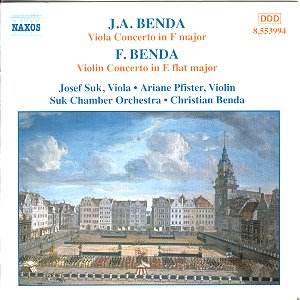Another in the long line of outstanding Bohemian musical
families the Bendas were similarly part of the diaspora that saw them
moving across the continent in search of court and church appointments
to further their careers. The Catholic Frantisek thus acquired a new
religion as well as a new name becoming the Protestant Franz Benda.
He served in Vienna, Warsaw and Dresden in a rapid space of time before
following the Prussian Crown Prince, now King, to Potsdam where he was
to remain for the rest of his life, having finally succeeded the court
favourite and violinist-Konzertmeister Carl Gottlieb Graun. A prolific
composer his Violin Concerto in E Flat Major is provisionally dated
to 1760. It’s a clear-cut, spruce and attractive work, cut from very
obviously Classical cloth with an undemandingly pleasant first movement
and a slow movement which has the feeling of an operatic aria. It has
an expressive freedom and a delicacy which never needs to sink to the
affecting depths and instead offers songful regret. The finale is conjecturally
noted as being influenced by CPE Bach, Benda’s Potsdam colleague and
is a slight disappointment in its rather timid gestural way.
Jiri Antonin (or Georg Anton as he was to become) joined
the royal court in 1742 but left for Saxe-Gotha in 1750 (another brother,
Johann Georg, had also joined the Prussian Court but moved to Berlin
where he was die in 1752). Jiri Antonin’s Melodramas were famously to
impress Mozart. The Viola Concerto was written in about 1775 and is
a splendid and attractive work in three movements. The first is full
of double stopping and a cadenza; the performance by Josef Suk observes
dynamics with scrupulous skill and the solo and orchestral tuttis are
differentiated with unerring tact. The slow movement is notable for
the exceptional length of the soloist’s opening phrase that emerges
somewhat pensive, unsure and apparently directionless. It soon though
becomes one of almost operatic depth, an aria, as the notes rightly
note – and one whose vocal impetus includes generous pauses into the
musical argument. Suk’s tone is nut brown here and coloured with generous
amplitude throughout the range. The finale is confident, elegant and
attractive. Benda’s Klagen (or Laments) was written towards the end
of his life in 1792 – in fact it’s probably his last work. Originally
written as a cantata for soprano with a text musing on the passing of
time and beauties of music it has been arranged for cello by soloist
and conductor Christian Benda (the cadenza in the Viola Concerto was
incidentally written by yet another Benda – Lola). The fleeting moods
are well caught in this performance which seeks to smooth over the work’s
occasional sectionality. Affectingly and sensitively done.
This is the second in Naxos’ Benda series – the first
was devoted to Jan Jiri’s G Major Violin Concerto and Frantisek’s D
Major and D Minor, where the excellent soloists were once more Suk and
Ariane Pfister. I enjoyed it immensely – especially the Viola Concerto.
Soloists who always play the Telemann – please note.
Jonathan Woolf
Affectingly and sensitively done. … see Full Review


